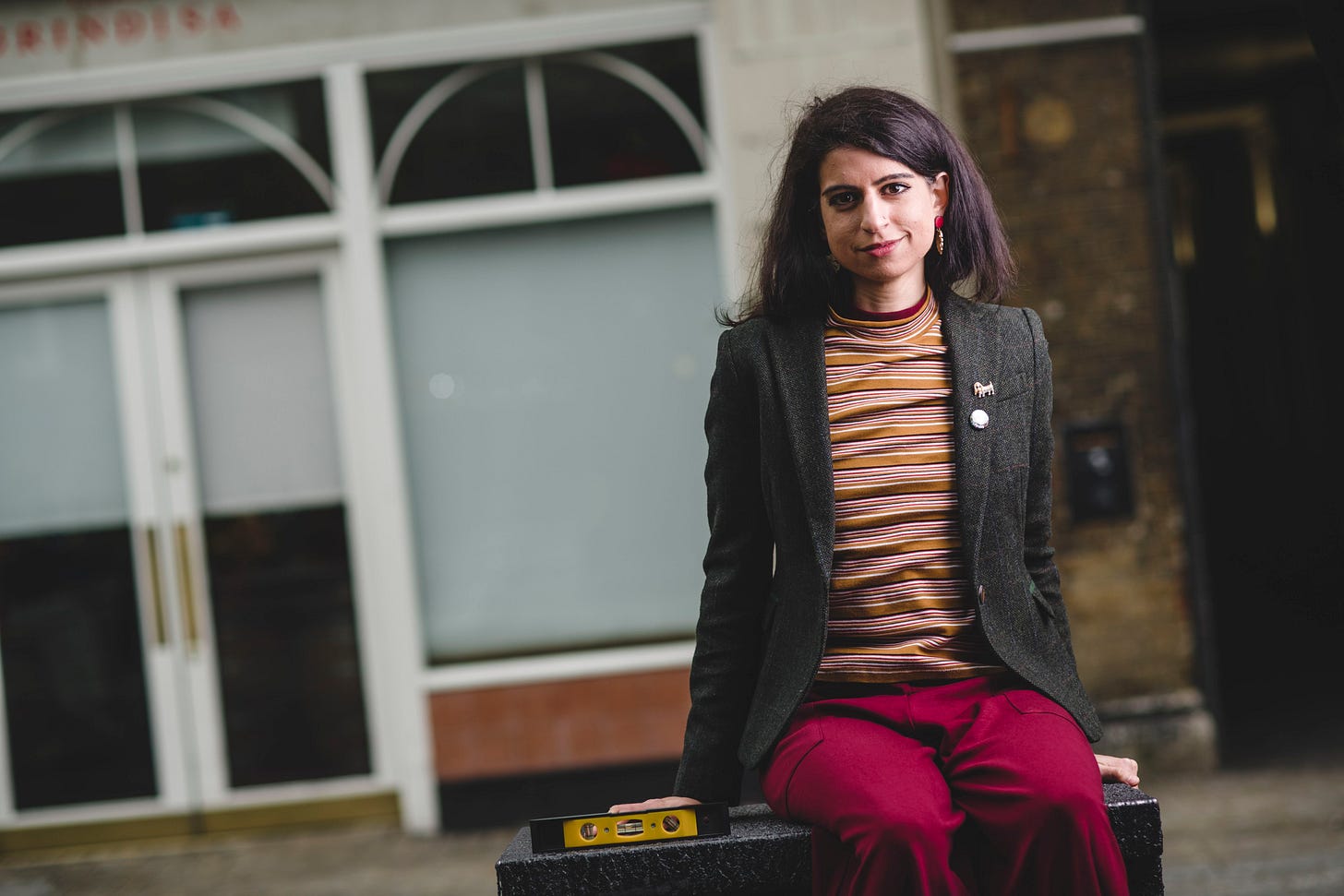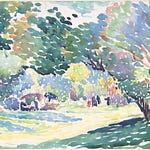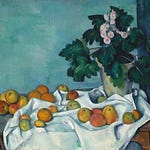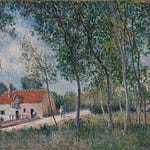
Editor’s note
As someone who now, effectively, lives between three different countries, I’ve become increasingly interested in the relationship between space and self. I’m finding that, far from being the passive surroundings onto which we project our experiences of the world, the places in which we conduct our days are, in fact, the very ingredients that determine who we are and how we are able to think.
These themes take center stage in Noreen’s A Flat Place, a rich and winding work which has as its subject the specific environment of flat landscapes — those that are not just geographic, but social and psychological, as well. As she writes in her book, “A flat place helps us to reimagine what it means for something to ‘happen’ and to rethink what it means for something to ‘matter.’ To accept that not all discoveries involve digging for answers, or ascending heights.”
It was a joy to take in the intricate cartography of her thoughts, both in this book and through our conversation.
Jana M. Perkins
Founder, Women of Letters
Noreen Masud is a Lecturer in English Literature at the University of Bristol, and an AHRC/BBC New Generation Thinker. Her memoir-travelogue, A Flat Place (Hamish Hamilton [Penguin] and Melville House Press, 2023), was shortlisted for the Women’s Prize for Non-Fiction, the Sunday Times Charlotte Aitken Trust Young Writer of the Year Award, the Jhalak Prize, and the RSL Ondaatje Prize.
How did your childhood shape your ideas about what work looked like and what was possible for you?
Noreen Masud: So, I had quite an unusual childhood. I was born and raised in Pakistan, lived there till I was 16, with a Pakistani dad and a white British mother. My dad was a doctor who worked very, very long hours. He treated a third of his patients for free, which was quite a big thing for somebody to do at that time. And he had very strong ideas, as did my mother, about what work was worthwhile and what work wasn’t.
The work that was worthwhile from his point of view was something like science or medicine or law, and that’s the same with many, many Pakistani families, I think. My mother had some medical training, but she stayed at home and looked after us. And my childhood gave me a great sense of responsibility to other people, and a sense that you don’t exist in this world to serve yourself — you exist to serve other people.
The sort of work that I have ended up doing, the study of English literature, is not something that was a possibility for me when I was growing up. I’m now a lecturer in English literature, in the UK, in Bristol, and I write creative non-fiction. And it was never possible — I knew that from when I was quite young, that I wouldn’t get to study these things or be allowed to study them, so I managed to get an English literature O Level sort of quite sneakily around the sides. I wasn’t really allowed to take it, but I sat in on the backs of classes and taught myself the material and sort of got my way through to do what I wanted to do.
And then when I was 16, my father disowned me and my sisters and threw my mother out, so we came to the UK, and I could do and study what I wanted to do. But it has— I think what that childhood left me with was a strong sense that the value of literature and of books is related to how they help us understand ourselves, each other, and the world around us well, and that must lead to a kind of unselfishness and sense of responsibility in stewarding and caring for that world and for those around us. I’ve never understood a model of literary study which does not involve, implicitly or otherwise, the sharpening of one’s sense of duty to the other.
The other thing I must say— I grew up in a family that valued books. You know, I wasn’t meant to study literature, but I was the luckiest person I know book-wise. I have to say that, because in many ways it was quite a rather bleak childhood, but one thing we did have was my mother brought books from the UK, because it was very hard to get books in Pakistan at that time. And I read and reread them. I had many more books in my house than, you know— there were many things we didn’t have. One thing we did have was books, and that was a tremendous privilege. So those are the ways, I think, in which my childhood shaped me, and also the ways in which I found wiggle room around what my childhood laid out as possible.
“What that childhood left me with was a strong sense that the value of literature and of books is related to how they help us understand ourselves, each other, and the world around us well.”
Jana M. Perkins: Was there a particular genre of writing, or kind of writing, that you were especially drawn to early on that helped develop this sense in you that, okay — this is what I want to be doing?
NM: Anything with rhythm. My mother remembers me as a very young child — and I obviously have no memory of this — at the age of two, sort of reciting a poem that I had found in a children’s magazine or something. I learned to read at sort of two and a half, so this is just about credible, I think. But rhythm I’ve always been drawn by and obsessed by, and I’ve always wanted to memorize any piece of writing that I didn’t understand or whose rhythm transfixed me. So that started very early on, and then at 14 I discovered poetry in a very concrete way, and that coincided more or less with our having access to the internet: there were poems on the internet, and you could download them and learn them, and that absolutely laid the groundwork for everything that came after, for my writing today. My first book was mostly on poetry. I’m very preoccupied with the sound of a sentence when I write, like so many writers, and that all comes from an early preoccupation with poetry.
At 11, I read Nineteen Eighty-Four. I remember that because it was a book that my mother didn’t want me to read at that time. It’s one of the only times I remember a book being taken away from me. She took it away, but I was so obsessed with it that I stole it back and finished it. Any sort of dystopian or speculative fiction — I was very… I did feel that the world wasn’t right. I felt that things in the world weren’t right, and I got great comfort from any writer who seemed also to think that, because I could see around me as a young child that things weren’t right. I could see the inequality and the poverty and the injustice and the hypocrisy endemic to any society, but which exist, in some ways, in Pakistan particularly on the surface. So poetry and speculative fiction, that’s what I’ll say.
JMP: I relate so much to both of those — that could be an entire separate conversation, on speculative and science fiction. But in terms of poetry, I had a similar experience. I have a background in poetry, a degree in poetry from the academic side, and I just found it such an accessible route into the study of literature. Which I think is rare.
NM: It is absolutely rare.
JMP: Right? I mean, people tend to assume, “Oh, poetry — that’s not for me. That’s gonna be really hard. I have to have mountains of knowledge before I can even attempt to begin that.” But, in fact, there’s such a logic to poetry that makes it a really easy entry-point, I think, in ways that prose doesn’t offer.
NM: Completely. Poetry is animal. You know, in poetry, the body and the voice and the tongue know how to read poetry. The brain is doing a bit of work, but, like the rest of your body, in its kind of instinctive animal way, are already doing the work — if you allow them in. And this is something that is so hard to communicate to anyone who has that idea, as you say, that poetry isn’t for me. It’s so hard to say, “Well, the reason you’re struggling is because you’re not allowing the rest of yourself in. The animal self.” You know?
“At 14 I discovered poetry in a very concrete way, and that coincided more or less with our having access to the internet: there were poems on the internet, and you could download them and learn them, and that absolutely laid the groundwork for everything that came after, for my writing today.”
One of the examples that I always think about is I was teaching Sylvia Plath’s poem “You’re,” which as you know, of course, is a kind of love song to her little baby — listing all the things that the baby is, all the kind of metaphorical images that she associates with the baby. And the charming bit, and the bit that my students found hardest, was the bit where she calls her baby a “little loaf.” And the students were kind of outraged about that. They were like, “Why would you call a baby a loaf? That’s so disparaging. Why wouldn’t you call it, like, a rose, or a flower?”
And I said, “Well, let’s think about loaves. What charming creature do we describe as a loaf?” And they were like, “Oh, cats!” And I’m like, “Is it disparaging to call a cat a loaf?” And they said, “No — cat loaves are adorable and charming.” And I’m like, “Of course.” So there’s so much, I think, in students’ reading of poetry, which is to do with what they do not know they are allowed to know when reading poetry. Because of course they knew that a cat loaf was charming and adorable and the most precious thing in the world. But the kind of assumption is that the sorts of knowledge you have to allow into a reading of poetry are so cerebral and so dutiful. Oh, flowers are nice; the baby has to be a flower. Ridiculous. Poetry is so much about the ridiculousness of the snuffling, eyeless human body.
Fast-forward to today. How did the path to what you’re doing now unfold?
NM: Through luck, and one stage at a time. So, I’m a lecturer now, in English, and I’m incredibly lucky to have a permanent job at a university. I still can’t really believe it.
After my undergrad, even while I was an undergraduate, I knew from having been taught by precarious staff members that the academic job market was horrific. It was horrific in, you know, 2007, when I started my undergraduate degree, and it’s many times more horrific now. I felt incredibly lucky even to be able to do an undergraduate degree in English, for the reasons I’ve outlined. That was as far as I managed to dream as a child. And then, I needed to go home after my undergraduate degree — it had been such a new world, it was such a separate experience from my home world. But then one of my tutors from my undergraduate said, “You should think about applying for a Master’s.” So I said, “Okay, I’ll apply for a Master’s.” And I got funding. I was one of the last cohort to get funding; if I hadn’t got funding, I couldn’t have done the Master’s.
“I felt incredibly lucky even to be able to do an undergraduate degree in English. That was as far as I managed to dream as a child.”
So I did the Master’s. And then I took two years out after that, and I did various things. I ghostwrote sex manuals. I was a cleaner. I was a tutor and an editor and a proofreader. I was — yeah, I did a lot of things. I was a waitress. And I applied for a PhD during that, and again I was like, “I’ll just apply for a PhD, because if I get that, that’s three years more of a liveable life.” You know? That’s three years more of being able to do the thing I want to do. And I don’t assume anything — I’m not going to get an academic job after that. So I applied for a PhD, and I got the funding, which I again couldn’t have done it without. And again, at the end of my PhD, I was like, “I’ll apply for a postdoc. If I get it, that’s three more years of bliss.” And I got it.
By the end of my postdoc, it started to seem possible to me that I might get the academic job, because I started having close shaves with jobs. I started getting interviews. I started sort of being second or third. You know, I wasn’t getting jobs — I was second or third. Then, the day that I turned 32, I was offered this job at Bristol.
It was all very disconnected, and I had no assumption. I’ve always thought of my life, from the age of 16, as just getting a few more good years and just getting a few more good years — you know, until kind of the horror sets in, the inevitable horror of life in this broken world. And I’m not saying that academia is— it’s by no means perfect. But there are so few jobs that I would wake up happy in the morning to do, and have a sense of vocation around, and have flexibility with my time to do in the right way, and which would house and accommodate my creative life. There is so much wrong in academia — not least its reliance on precarious labour, and that has to change. I know that I’m immensely lucky.
JMP: I hear that a lot from writers and researchers and artists, the sense of buying time: looking for ways to just continue being able to nurture their sense of creativity.
NM: It’s the doing that matters. It’s not that I want to be an X — that’s never been interesting to me, to have the identity of academic or writing. The important thing is the time spent doing the thing that absorbs you. And in this world, that doesn’t necessarily get to be a career. You know? One is tremendously lucky when it ends up being that, but I live in the assumption that this will end any time.
My job is ‘permanent,’ but the crisis in universities in the UK is so bad that, you know, I reckon — what? We’ve got… five more years before the compulsory redundancies start at my institution? What will I do then? Well, maybe I’ll be able to find another way to eke out another bit of livable life.
JMP: That, I think, is something that, these days, we are struggling with in ways that people of previous generations haven’t had to.
NM: No.
JMP: You know? We have such a short time horizon, where it’s like, “Okay, the next year — maybe two, three years.” But we don’t have the luxury of thinking, “Oh, you know — I’m just gonna get this job, I’ll be here for 10, 20 years.”
NM: Oh, completely. Completely. I’ve been in the UK since 2005, and the decline in visible job security and the visible rise of the gig economy horrifies me. The only people who are getting rich are the entrepreneurs and the inheritors of wealth — getting richer and richer. We privilege, we reward, we kowtow to the wrong parts of society. It should be shameful to be a billionaire. I’m very, very atheist — I was brought up Muslim, but I think all the time about the idea from the Bible that it is easier for a camel to pass through the eye of a needle than for a rich man to get into heaven. I think it’s sinful to sequester wealth while everybody else does without.
“It’s the doing that matters. It’s not that I want to be an X — that’s never been interesting to me, to have the identity of academic or writing. The important thing is the time spent doing the thing that absorbs you.”
Did you have any mentors along the way?
NM: I owe a great deal to my undergraduate tutors, who were so kind to me in various ways.
I remember one tutor— I was short of money when I was an undergraduate, for various reasons. And I was on the highest possible bursary, and I was also just very terrified of what would happen after and preoccupied with saving. And my undergraduate tutor said to me, “You should get these books. They’ll help you.” And I said, “Oh, you know — I’ll see if they have them in the library or something.” “No, you should actually get copies; it’ll be useful.” And I’m like, “Oh, you know, well — don’t worry. I’ll find a solution. I’ll find a solution.” Brushing it off; I wasn’t going to buy them.
And I can’t name this tutor, because she still might get into trouble for doing it. When I went down to my pigeonhole, I found money there and a note from her: 20 pounds, and a note from her, saying, “You must have the books that you need.” So many rules were broken there. But that was life-changing for me, that gesture — that my education might be important enough to somebody for them to just give me money like that. I remember that very strongly.
[…]
Our conversation with Noreen continues on the podcast. You can listen along using the audio player at the top of this post, Apple Podcasts, or Spotify.
Where can our listeners and readers find you?
NM: I am most active on Twitter — the handle is @NoreenMasud, no spaces or underscores. I’m on Instagram, at @Noreen_Masud. I also have a really out-of-date website that needs to be migrated from a host that I’m boycotting and revamped, so don’t go there. Everything new is on my Twitter.
We spoke with Noreen remotely. Our conversation has been edited for clarity.
Thanks for being here! We’re delighted that you’re a part of the Women of Letters community. If you are too, here are a few ways you can help build it:
❤️ Heart this interview and leave a comment.
💌 Recommend our series with a testimonial. We’ll feature our favourites on the home page.
💬 Forward your favourite interviews to the people you care about, or share a link to womenofletters.substack.com.














Share this post